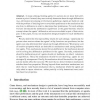Free Online Productivity Tools
i2Speak
i2Symbol
i2OCR
iTex2Img
iWeb2Print
iWeb2Shot
i2Type
iPdf2Split
iPdf2Merge
i2Bopomofo
i2Arabic
i2Style
i2Image
i2PDF
iLatex2Rtf
Sci2ools
111
click to vote
AMEC
2004
Springer
2004
Springer
Designing Auctions for Deliberative Agents
Abstract. In many settings, bidding agents for auctions do not know their preferences a priori. Instead, they must actively determine them through deliberation (e.g., information processing or information gathering). Agents are faced not only with the problem of deciding how to reveal their preferences to the mechanism but also how to deliberate in order to determine their preferences. For such settings, we have introduced the deliberation equilibrium as the game-theoretic solution concept where the agents’ deliberation actions are modeled as part of their strategies. In this paper, we lay out mechanism design principles for such deliberative agents. We also derive the first impossibility results for such settings - specifically for private-value auctions where the agents’ utility functions are quasilinear, but the agents can only determine their valuations through deliberation. We propose a set of intuitive properties which are desirable in mechanisms used among deliberative age...
AMEC 2004 | Deliberation | Deliberative Agents | Information Management | Mechanism Design Principles |
Related Content
| Added | 30 Jun 2010 |
| Updated | 30 Jun 2010 |
| Type | Conference |
| Year | 2004 |
| Where | AMEC |
| Authors | Kate Larson, Tuomas Sandholm |
Comments (0)

